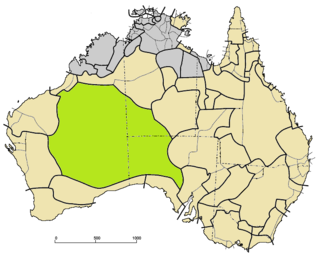
The Warlpiri, sometimes referred to as Yapa, are a group of Aboriginal Australians defined by their Warlpiri language, although not all still speak it. There are 5,000–6,000 Warlpiri, living mostly in a few towns and settlements scattered through their traditional land in the Northern Territory, north and west of Alice Springs. About 3,000 still speak the Warlpiri language. The word "Warlpiri" has also been romanised as Walpiri, Walbiri, Elpira, Ilpara, and Wailbri.

The Western Desert language, or Wati, is a dialect cluster of Australian Aboriginal languages in the Pama–Nyungan family.

Balgo, previously Balgo Hills and Balgo Mission, is a community in Western Australia that is linked with both the Great Sandy Desert and the Tanami Desert. The community is in the Shire of Halls Creek, off the Tanami Road, and was established by German missionaries in 1939. In the 2021 census Balgo's population numbered 430.
Kukatj, also rendered Gugadj, is an extinct Paman language of the Cape York Peninsula, Queensland, Australia. The name Kalibamu has also been assigned to it, although this may be a separate dialect. It is spoken by the Kukatj people. A single speaker was last recorded in 1975.
The Nyamal are an Indigenous Australian people of the Pilbara area of north-western Western Australia.
The Miriwoong people, also written Miriwung and Miriuwung, are an Aboriginal Australian people of the Kimberley region of northern Western Australia.
The Jawi people, also spelt Djaui, Djawi, and other alternative spellings, are an Aboriginal Australian people of the Kimberley coast of Western Australia, who speak the Jawi dialect. They are sometimes grouped with the Bardi people and referred to as "Bardi Jawi", as the languages and culture are similar.
The Ngolibardu, otherwise written, Ngulipartu, were an Aboriginal Australian people of Western Australia.
The Ngarla are an Aboriginal Australian people of the Pilbara region of Western Australia.
The Mandjildjara, also written Manyjilyjarra, are an Aboriginal Australian people of Western Australia.
The Walmadjari (Walmajarri) people, also known as Tjiwaling and Wanaseka, are an Aboriginal Australian people of the Kimberley region of Western Australia.
The Kurajarra were an Aboriginal Australian people of the Pilbara region of Western Australia.
The Ildawongga are an Aboriginal Australian people of the Pilbara region of Western Australia.
The Ngardi, also spelled Ngarti, are an Aboriginal Australian people of the Northern Territory and Western Australia.
The Ngaatjatjarra are an Indigenous Australian people of Western Australia, with communities located in the north eastern part of the Goldfields-Esperance region.
The Nakako are an Aboriginal Australian people of Western and Southern Australia.
The Mandjindja or Mantjintjarra are an Aboriginal Australian people of Western Australia belonging to the Western Desert cultural bloc.
The Jabirr Jabbirr are an Aboriginal Australian people of the Kimberley region of Western Australia.
The Kukatj are an Aboriginal Australian people of the Cape York Peninsula in the state of Queensland. They are to be distinguished from the Kukatja of Western Australia and the Luritja of the Northern Territory, who have also historically been known as Kukatja.

The Kokatha language, also written Kukatha, Kokata, Gugada, and other variants, and also referred to as Madutara, Maduwonga, Nganitjidi, Wanggamadu, and Yallingarra and variant spellings of these, is an Australian Aboriginal language of the Western Desert group traditionally spoken by the Kokatha people, whose traditional lands are in the western part of the state of South Australia, north of the Wirangu people.